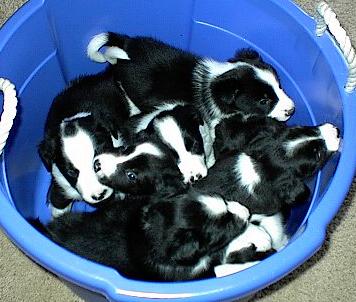
My fiance told me this story over dinner this evening.
The Anti-Cruelty Society (ACS), where she volunteers, had a dog-washing fundraiser today, at which Jen was volunteering. The ACS has an attached parking garage, and after the dog-washing event, she and several other volunteers were taking the elevator down from the upper levels to the main floor when a woman who had just parked got on. She said she was to meet her daughter there, who was hoping to adopt a dog that day. Once the woman discovered that she was surrounded by volunteers, she asked them a question: "What is your return policy?"
To their credit, the volunteers handled the situation well, explaining that if the puppy became ill, she could obtain free vet care through ACS for the first 15 or so days after adoption. They also explained that, if something was truly problematic for her daughter with her new family member, ACS prefers that she return the dog to them rather than just releasing it or giving it away to somebody else. However, they diplomatically and subtly emphasized that having to return the dog was frowned upon because it, more often than not, signified an owner who was not serious about living with a pet.
I am appalled. And, as I found out from Jen, so were the volunteers. While of course there is a chance that, even with the most careful screening and love, a dog might be destructive or dangerous and not respond to training. In these instances, bringing the dog back to ACS is understandable. However, the woman's question belies her misshapen view of animals as commodities. You return a purse or a shirt or a stereo because something's wrong with it or you end up not wanting it. You don't "return" a fellow animal. Who among you would ask your doctor just after giving birth if you could give the baby away if you didn't like it or if it was too much work?
There are highly related questions that ARE appropriate and important to ask, such as, "What do we do if the dog becomes ill shortly after adoption?" or "What if he's having a behavioral issue that I am having trouble dealing with?" These questions are good to ask before adoption, and are coming from a mental state of love for the animal because they are focused on solutions for common problems—ACS can tell you about their vet care or about training options.
What worries me further is that the treatment of non-human animals as commodities is a pretty common view—Jen told me that she had read that a statistically significant number of people have given up their pets of several years to shelters with the reason, "She doesn't match our decor anymore." (sorry, I don't have a source link for this; it's hearsay)
We need greater educational systems in place to teach people the true value of life: non-human life is no less sacred than human life. This broad statement has many subtle implications and sub-points, and I can immediately think of a number of arguments that people I know would put forth to argue this point. That's a topic for another post. For now, just give some thought to our treatment of non-humans. Generally speaking, if you wouldn't do it to your own child, then you probably shouldn't do it to your dog or cat or ferret.



